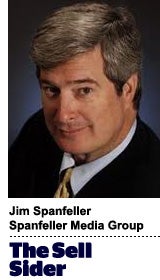 “The Sell-Sider” is a column written by the sell side of the digital media community.
“The Sell-Sider” is a column written by the sell side of the digital media community.
Today’s column is written by Jim Spanfeller, CEO at Spanfeller Media Group.
No news here, but we have devolved into a short-term focused economy. That is as true in digital as it is elsewhere.
There are many examples of where this thinking causes deep pain in the long-term prospects for individual companies and for our industry as a whole. Perhaps the most important examples are the twin topics of privacy and transparency.
In both cases, we can go back to Abe Lincoln’s ascribed axiom: “You can fool some of the people all of the time, and all of the people some of the time, but you cannot fool all of the people all of the time.”
I think most independent-thinking folks in our industry — meaning those not directly aligned with companies that benefit from privacy infringements or a wholesale lack of transparency (you know who you are) — can see a future where one or both of the following is the norm, and not the exception.
• “Do Not Track” is standard and third-party cookies are not useful, perhaps because most browsers cease accepting them or — this is admittedly less likely to happen in the near future — the government regulates them into retirement.
• Transparency is the norm and marketers and their buying agents can easily identify what site their ads will be placed and where on specific pages they will land.
These two thoughts are connected in more ways than not, so they make a good stalking horse for my point. Fundamentally, the sooner we get where we all (or mostly all) think we are going and need to be, the better off the industry will be in the long term. The sooner real brand dollars flow online, the more fulfilled end users will be and the less black-hat activity we will wade through.
It is clear we are finally beginning to address some of the issues. Among them are nonhuman traffic, poor to outright destructive ad placement, nonviewable banners and, most importantly, low trust levels between the industry and its consumers, including both end users and marketers. As I say, we are just beginning to address these issues, but we are doing so from the symptom side as opposed to addressing the root cause. We must make these practices unprofitable. The sooner we get to the end of this road, the better and the faster our industry will grow.
I fully understand the issues involved here. We have more than a few companies in the ecosystem that would be negatively impacted or fully devastated by this shift. At one point the IAB even suggested that advertising as we have known it would cease to exist. But let’s think about these issues for a moment.
First and in reverse order, it is very clear that advertising would not cease to exist without third-party cookies (already a good percentage of browsers do not accept third-party cookies), long-tail publishers would not go away and the world would not end. I would argue just the opposite and suggest that marketers would get a whole lot better bang for their buck than they receive now with digital advertising. Take my word for it. (Yes, I am saying that with tongue in cheek.)
As to the more pointed thought of economic destruction caused to this not insignificant segment of our ecosystem — which in many ways has served as a key argument against moving along this continuum faster — I simply refer you to Joseph Schumpeter’s term of creative destruction. It’s a concept that has been at work in full force around analogue media companies for the past decade. Just because a company is digital does not make it immune to obsolescence. The fact that we are moving towards a moment when a whole segment of companies will face this gale of change makes this harder, but not less true.
There are countless examples of these moments in history. Buggy whips certainly come to mind.
My core point is that the sooner we get to a place where both our end users and our marketing partners fully trust us, the better off we will be as a whole. I take no pleasure in the fact that a good number of companies and their employees will be disrupted, but I will say (and perhaps this is more than a bit Pollyanna) that it will happen at some point. The longer we wait, the more damage is done in the meantime to nearly all, including some affected companies, which, despite the change, will be able to evolve.
Change is hard, but it is constant and has steadily increased in velocity. We must embrace change; this is one of those moments when a trite statement like this becomes hard. Many have begun to make the call, including perhaps most loudly and certainly most recently, Ziff Davis CEO Vivek Shah at the last IAB leadership meeting.
We have to do more than talk about this. We need to take action. The sooner we do, the better off the industry will be, along with everyone in it — even those working in companies that will face real issues around transparency or third-party cookies.
Follow Jim Spanfeller (@JimSpanfeller) and AdExchanger (@adexchanger) on Twitter.












